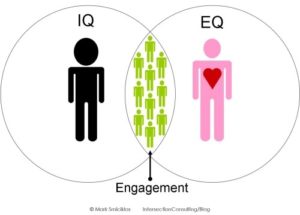
Adapted from an image by Mark Smiciklas
We all know about measuring IQ (intelligence quotient), but lately, I’ve heard more and more about another important measurement—EQ (emotional intelligence quotient). This is a measure of the ability to identify, assess, and control emotional responses in others and ourselves.
The last five leadership and business books I read all have had chapters on the topic of emotional intelligence. So when Briana, our HR consultant, came to me and said she had an assessment for emotional intelligence, I listened carefully.
She said the emotional intelligence (EQ) assessment covers five key areas: self-awareness, self-regulation, motivation (internal or external), empathy and social skills. Quite frankly, I believe these elements are vitally important to the personal and professional success of anyone, no matter what they do.
Psychologist Daniel Goleman, in his book Emotional Intelligence, suggests that emotional Intelligence actually might be more important than traditional intelligence when it comes to success. Think of it as “street smarts” versus “book smarts.” Most everyone will agree that you need both to succeed; some say street smarts—the ability to identify emotions, relate to others and communicate effectively—might be more essential than the ability to think logically. Certainly, emotional intelligence would benefit salespeople in relating to customers. Studies have shown that successful leaders are more emotionally intelligent, too.
So it’s little wonder that today many companies are adding EQ assessments to the hiring process and emotional intelligence training in the workplace. EQ improves predictions of how people will react in different situations. (Most of our clients already use assessments in their hiring, employee-development and team-building efforts with executives, managers, and employees. EQ is just one more tool.)
I’ve come to believe that EQ is so important that we’ve added it to our executive coaching program for 2018. All executives in our program now will take the assessment and go through a series of debriefs to better understand themselves and how to relate to and lead others.
While EQ and IQ both play a role in success, it’s important to note that true success encompasses much more. True success relates to accomplishments in all areas of life. That’s why we’ve been sharing our 7 F’s of True Success for more than 15 years now. With a balanced approach to life in and out of the office, this model takes into account your fundamentals of work, solid finances, family life, faith, fitness and even fun and then addresses the fusion of all these. Adding EQ assessments to a proven and comprehensive coaching process is just one more way we help you do what you do better—professionally and personally.
If you’d like to learn more about our EQ assessments, or any of our other coaching and development tools, contact Briana Dudley at briana@corsini.com
“90% of the difference between star performers and average performers in senior leadership positions is EQ.”
– Daniel Goleman
Recent Comments